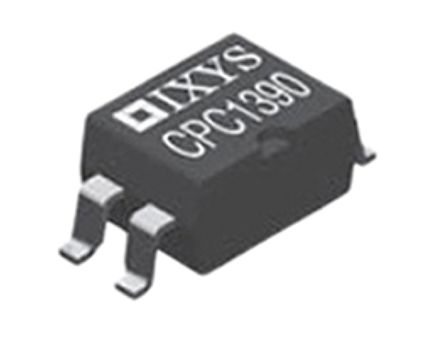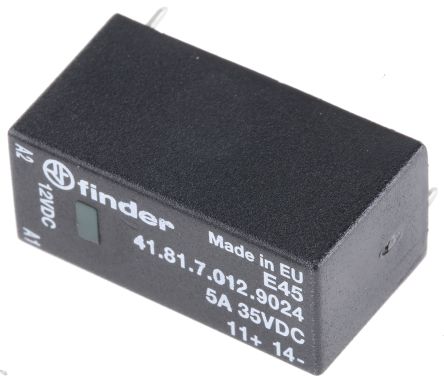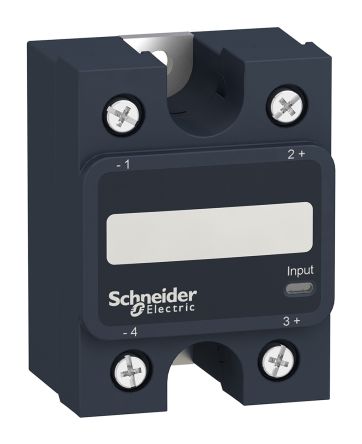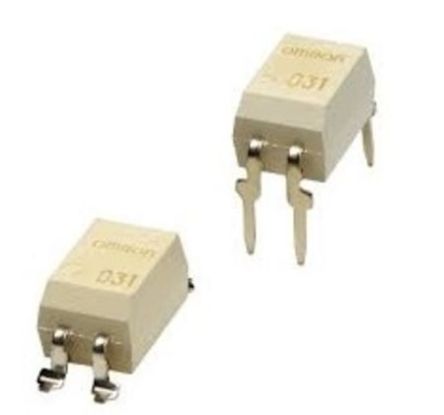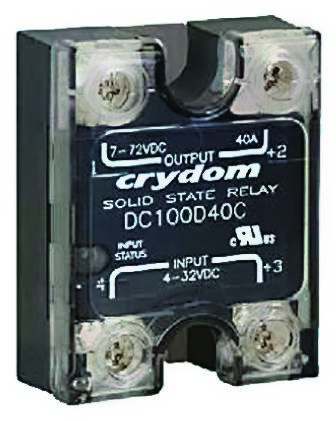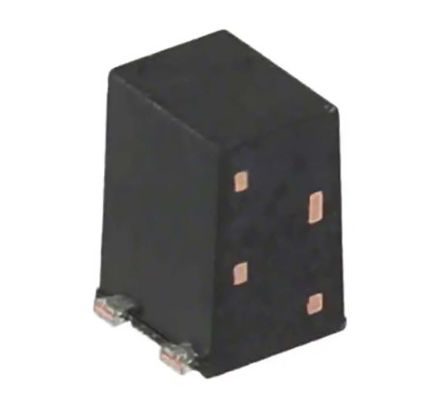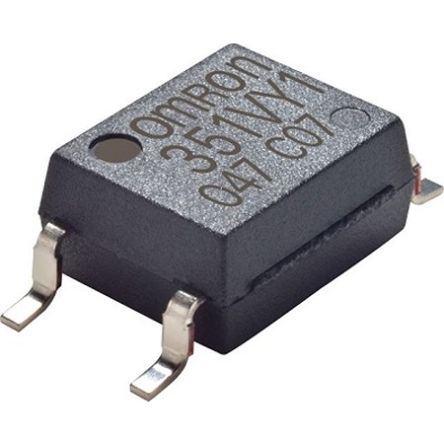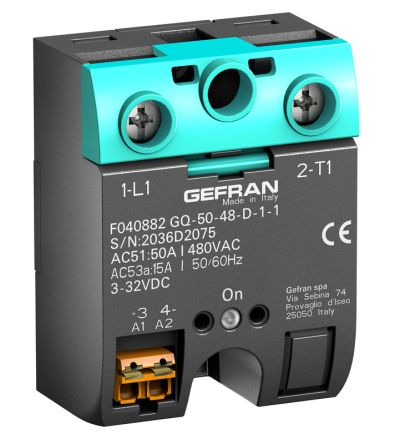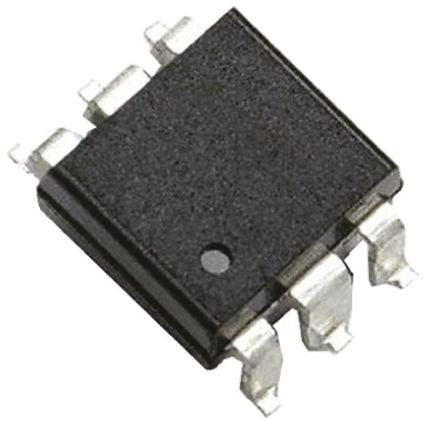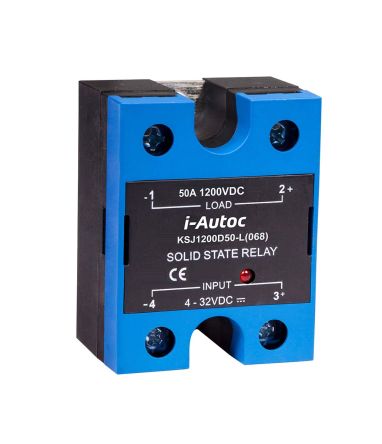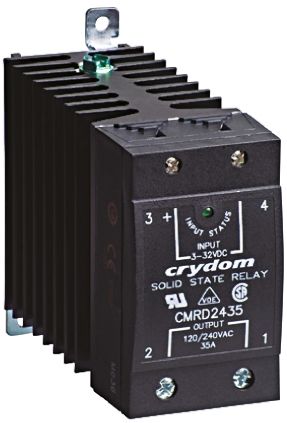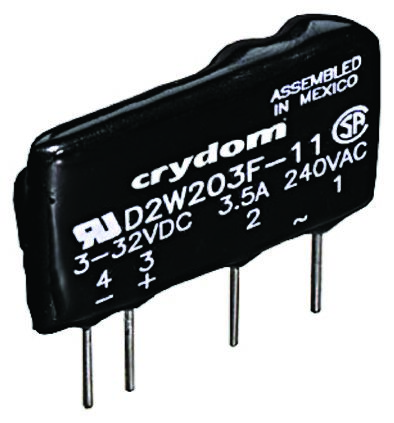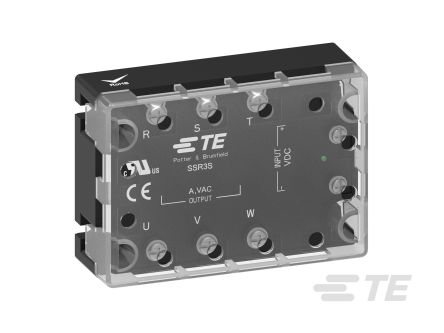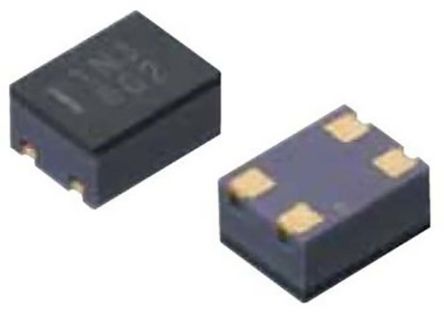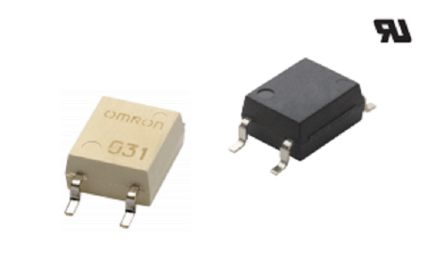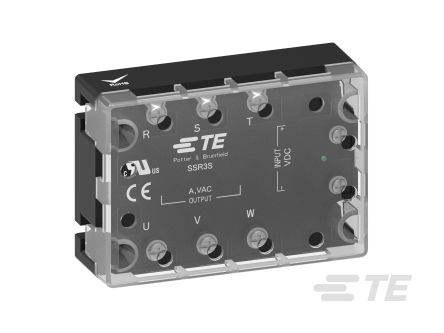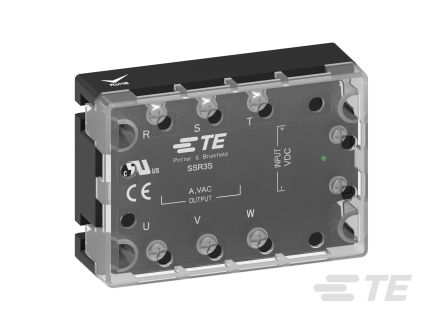- Automation & Control Gear
- Cables & Wires
- Enclosures & Server Racks
- Fuses & Circuit Breakers
- HVAC, Fans & Thermal Management
- Lighting
- Relays & Signal Conditioning
- Switches
- Batteries & Chargers
- Connectors
- Displays & Optoelectronics
- ESD Control, Cleanroom & PCB Prototyping
- Passive Components
- Power Supplies & Transformers
- Raspberry Pi, Arduino, ROCK, STEM Education & Development Tools
- Semiconductors
Solid State Relays
Solid state relays, or SSRs, are electronic switching devices that utilise semiconductors to switch circuits on or off. Unlike electromechanical relays, SSRs have no moving parts, leading to increased reliability and a longer operational lifespan as they are not subject to mechanical wear and tear.
SSRs achieve switching by applying a small external voltage (either AC or DC, depending on the SSR type) across its control terminals. This voltage activates the internal semiconductor components, causing the SSR to either close the circuit (turn on) or open the circuit (turn off). Because they use the electrical and optical properties of semiconductors, solid state relays can switch much faster than traditional electromechanical relays.
How to Choose Between Solid State Relays and Electromechanical Relays
Choosing between solid state relays (SSRs) and electromechanical relays (EMRs) depends heavily on the specific application requirements. Understanding the strengths and weaknesses of each type will help you select the best relay for your needs.
When to Choose Solid State Relays (SSRs)
Solid state relays excel in applications demanding high switching speeds, long lifespans, and silent operation. Their lack of moving parts makes them ideal for frequent switching and harsh environments. You typically would look to buy a solid state relay when:
- You need rapid switching speeds for precise control.
- The application requires a high cycle life and long-term reliability.
- Silent operation is essential.
- The environment is harsh or subject to vibration.
- You need a relay that can handle high currents.
When to Choose Electromechanical Relays
Electromechanical relays (EMRs) are often preferred for their lower cost and ability to switch higher voltages and currents directly. While they may not have the lifespan of an SSR, they are a robust choice for many general-purpose applications. Choose EMRs when:
- Cost is a primary concern.
- Simple, reliable switching is needed.
- The application doesn't require frequent switching.
- Isolation between control and load circuits is paramount.
Common Mounting Options for Solid State Relays
Solid state relays offer a variety of mounting options to accommodate different installation needs. The appropriate mounting method ensures secure placement and efficient heat dissipation for optimal performance.
- DIN Rail Mounting: DIN rail solid state relays are built to clip onto standardised DIN rails, commonly used in industrial control panels.
- Panel Mounting: Panel mounting involves securing the SSR to a panel using screws or bolts, often through a cutout.
- PCB Mounting: PCB mount SSRs are designed with pins for soldering directly onto a printed circuit board.
- Chassis Mounting: Chassis mounting involves attaching the SSR to a chassis or metal enclosure, often for heat sinking purposes.
- Surface Mounting: Surface mount SSRs are designed for direct mounting onto a surface, typically using adhesive or screws.
Common Types of Solid State Relays
Solid state relays are available in several types, each designed for specific applications and load requirements.
AC Solid State Relays
AC solid state relays** (SSRs)** are designed to switch AC loads, such as motors, heaters, and lighting. These SSR relays are commonly used in industrial automation and offer fast switching speeds and long lifespans. You can buy solid state relays specifically designed for AC loads.
DC Solid State Relays
DC solid state relays or DC SSR relays are used for switching DC loads, like solenoids, LEDs, and DC motors. These solid state relay SSR options are crucial in DC control circuits and offer silent, reliable operation.
Zero Cross SSRs
Zero-cross solid state relays are a specialised type of AC SSR that switches the load only when the AC voltage crosses zero. This minimises electromagnetic interference (EMI) and reduces stress on the load, making them ideal for resistive loads. Ask your solid state relay supplier if you need a SSR for noise-sensitive applications.
Benefits of Solid State Relays (SSRs)
Solid state relays (SSRs) offer numerous advantages over traditional electromechanical relays:
- Increased Reliability: SSRs have no moving parts to wear out, eliminating a common failure point in electromechanical relays.
- No Contact Bounce: The absence of mechanical contacts eliminates contact bounce, ensuring clean and consistent switching.
- Faster Switching Speeds: Solid state relays can switch both ON and OFF much faster than electromechanical relays, enabling more precise control.
- Zero Voltage Turn-On/Zero Current Turn-Off: Some SSR relays offer zero-voltage turn-on and zero-current turn-off, minimising electrical noise and transients.
- Longer Lifespan: The lack of mechanical wear contributes to a significantly longer lifespan for solid state relays.
- Silent Operation: Solid state relays operate silently, unlike the clicking sounds associated with electromechanical relays.
- Reduced Maintenance: With no parts to wear out, solid state relays require minimal maintenance.
Applications of Solid State Relays
Solid state relays (SSRs) find applications across a broad range of industries due to their reliability, speed, and silent operation.
- Industrial Control: SSRs are essential in industrial automation for controlling various processes, including temperature control, motor control, and lighting, enabling precise and reliable operation.
- Robotics: In robotics, SSRs facilitate rapid and accurate switching for robotic arm movements, sensor activation, and other critical functions, ensuring smooth and precise performance.
- Data Acquisition: SSRs are used in data acquisition systems to switch signals quickly and reliably, ensuring accurate data capture and efficient system operation.
- Aerospace: SSRs play a crucial role in aerospace applications, managing power distribution and controlling various systems in aircraft and spacecraft where reliability is paramount.
- Automotive: In the automotive industry, SSRs control various functions such as lighting, heating, and motor control, contributing to enhanced vehicle performance and safety.
- Medical Equipment: SSRs are employed in medical equipment for precise control of devices and systems, ensuring patient safety and the reliable operation of critical medical technologies.
- Lighting Control: SSRs are widely used in lighting control systems for both residential and commercial applications, enabling efficient and reliable switching of lighting circuits.
- Heating and Cooling Systems: SSRs are used in HVAC systems for precise temperature control and efficient switching of heating and cooling elements, leading to improved energy efficiency.
How to Choose the Right Solid State Relay
Consider these factors when it’s time to select and buy a solid state relay:
- Load Requirements: Match the SSR relay's rated voltage and current to the load's requirements. Consider the load type (resistive, inductive, capacitive) as it significantly impacts the SSR's switching needs. A high current solid state relay might be necessary for demanding applications.
- Control Voltage: Ensure the control voltage of the DC solid state relay or AC SSR is compatible with your control circuit.
- Switching Characteristics: Determine the required switching frequency. If frequent switching is necessary, choose an SSR designed for high-frequency operation. For AC loads, consider whether a zero-cross switching SSR is needed to minimise EMI.
- Thermal Management: Solid state relays generate heat, especially at higher currents. Factor in the ambient temperature and ensure adequate heat sinking to prevent overheating.
- Mounting Style: Select the appropriate mounting style (DIN rail, panel, PCB, etc.) for your installation. A DIN rail solid state relay simplifies installation in industrial control panels.
How to Order Solid State Relays from RS Hong Kong
RS Hong Kong is a leading supplier of solid state relays (SSRs), offering a wide selection of high-quality SSR relays from trusted brands like Omron, Siemens, Schneider Electric, and more.
We stock a variety of DC solid state relays, AC SSRs, and other specialised solid state relay SSR options to meet diverse application needs. Our user-friendly online platform makes it easy to browse and buy solid state relay products, compare solid state relay price and cost, and find the perfect SSR for your project.
In addition to solid state relays, RS Hong Kong also provides a comprehensive range of complementary products, including heat sinks, DIN rails, and terminal blocks, allowing you to source all your components in one place.
How Delivery Works at RS Hong Kong
We offer flexible delivery services, including next-day and express options, to ensure you receive your products promptly and efficiently. For more information about our delivery options, fees, and estimated delivery times, please visit our delivery information page.
Popular Searches
- ABB Solid State Relays
- Broadcom Solid State Relays
- Carlo Gavazzi Solid State Relays
- Celduc Solid State Relays
- Crouzet Solid State Relays
- Finder Solid State Relays
- IXYS Solid State Relays
- Omron Solid State Relays
- Panasonic Solid State Relays
- Phoenix Contact Solid State Relays
- Schneider Electric Solid State Relays
- Siemens Solid State Relays
